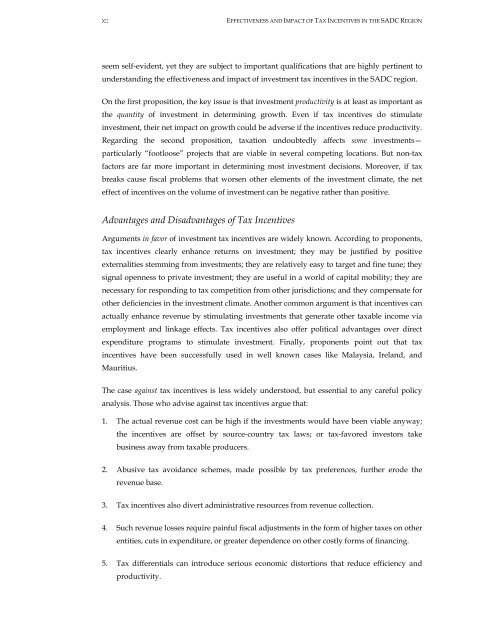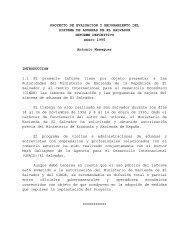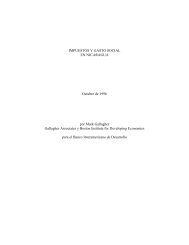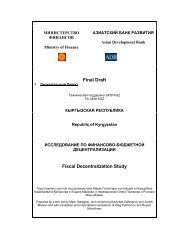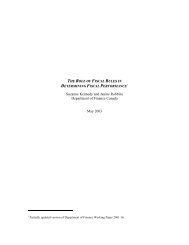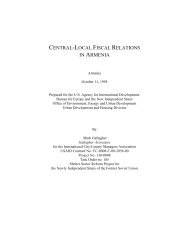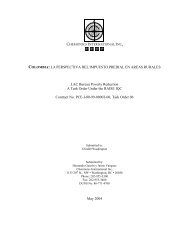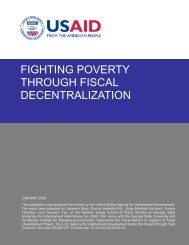Effectiveness and Economic Impact of Tax Incentives in the SADC ...
Effectiveness and Economic Impact of Tax Incentives in the SADC ...
Effectiveness and Economic Impact of Tax Incentives in the SADC ...
You also want an ePaper? Increase the reach of your titles
YUMPU automatically turns print PDFs into web optimized ePapers that Google loves.
XII EFFECTIVENESS AND IMPACT OF TAX INCENTIVES IN THE <strong>SADC</strong> REGION<br />
seem self-evident, yet <strong>the</strong>y are subject to important qualifications that are highly pert<strong>in</strong>ent to<br />
underst<strong>and</strong><strong>in</strong>g <strong>the</strong> effectiveness <strong>and</strong> impact <strong>of</strong> <strong>in</strong>vestment tax <strong>in</strong>centives <strong>in</strong> <strong>the</strong> <strong>SADC</strong> region.<br />
On <strong>the</strong> first proposition, <strong>the</strong> key issue is that <strong>in</strong>vestment productivity is at least as important as<br />
<strong>the</strong> quantity <strong>of</strong> <strong>in</strong>vestment <strong>in</strong> determ<strong>in</strong><strong>in</strong>g growth. Even if tax <strong>in</strong>centives do stimulate<br />
<strong>in</strong>vestment, <strong>the</strong>ir net impact on growth could be adverse if <strong>the</strong> <strong>in</strong>centives reduce productivity.<br />
Regard<strong>in</strong>g <strong>the</strong> second proposition, taxation undoubtedly affects some <strong>in</strong>vestments—<br />
particularly “footloose” projects that are viable <strong>in</strong> several compet<strong>in</strong>g locations. But non-tax<br />
factors are far more important <strong>in</strong> determ<strong>in</strong><strong>in</strong>g most <strong>in</strong>vestment decisions. Moreover, if tax<br />
breaks cause fiscal problems that worsen o<strong>the</strong>r elements <strong>of</strong> <strong>the</strong> <strong>in</strong>vestment climate, <strong>the</strong> net<br />
effect <strong>of</strong> <strong>in</strong>centives on <strong>the</strong> volume <strong>of</strong> <strong>in</strong>vestment can be negative ra<strong>the</strong>r than positive.<br />
Advantages <strong>and</strong> Disadvantages <strong>of</strong> <strong>Tax</strong> <strong>Incentives</strong><br />
Arguments <strong>in</strong> favor <strong>of</strong> <strong>in</strong>vestment tax <strong>in</strong>centives are widely known. Accord<strong>in</strong>g to proponents,<br />
tax <strong>in</strong>centives clearly enhance returns on <strong>in</strong>vestment; <strong>the</strong>y may be justified by positive<br />
externalities stemm<strong>in</strong>g from <strong>in</strong>vestments; <strong>the</strong>y are relatively easy to target <strong>and</strong> f<strong>in</strong>e tune; <strong>the</strong>y<br />
signal openness to private <strong>in</strong>vestment; <strong>the</strong>y are useful <strong>in</strong> a world <strong>of</strong> capital mobility; <strong>the</strong>y are<br />
necessary for respond<strong>in</strong>g to tax competition from o<strong>the</strong>r jurisdictions; <strong>and</strong> <strong>the</strong>y compensate for<br />
o<strong>the</strong>r deficiencies <strong>in</strong> <strong>the</strong> <strong>in</strong>vestment climate. Ano<strong>the</strong>r common argument is that <strong>in</strong>centives can<br />
actually enhance revenue by stimulat<strong>in</strong>g <strong>in</strong>vestments that generate o<strong>the</strong>r taxable <strong>in</strong>come via<br />
employment <strong>and</strong> l<strong>in</strong>kage effects. <strong>Tax</strong> <strong>in</strong>centives also <strong>of</strong>fer political advantages over direct<br />
expenditure programs to stimulate <strong>in</strong>vestment. F<strong>in</strong>ally, proponents po<strong>in</strong>t out that tax<br />
<strong>in</strong>centives have been successfully used <strong>in</strong> well known cases like Malaysia, Irel<strong>and</strong>, <strong>and</strong><br />
Mauritius.<br />
The case aga<strong>in</strong>st tax <strong>in</strong>centives is less widely understood, but essential to any careful policy<br />
analysis. Those who advise aga<strong>in</strong>st tax <strong>in</strong>centives argue that:<br />
1. The actual revenue cost can be high if <strong>the</strong> <strong>in</strong>vestments would have been viable anyway;<br />
<strong>the</strong> <strong>in</strong>centives are <strong>of</strong>fset by source-country tax laws; or tax-favored <strong>in</strong>vestors take<br />
bus<strong>in</strong>ess away from taxable producers.<br />
2. Abusive tax avoidance schemes, made possible by tax preferences, fur<strong>the</strong>r erode <strong>the</strong><br />
revenue base.<br />
3. <strong>Tax</strong> <strong>in</strong>centives also divert adm<strong>in</strong>istrative resources from revenue collection.<br />
4. Such revenue losses require pa<strong>in</strong>ful fiscal adjustments <strong>in</strong> <strong>the</strong> form <strong>of</strong> higher taxes on o<strong>the</strong>r<br />
entities, cuts <strong>in</strong> expenditure, or greater dependence on o<strong>the</strong>r costly forms <strong>of</strong> f<strong>in</strong>anc<strong>in</strong>g.<br />
5. <strong>Tax</strong> differentials can <strong>in</strong>troduce serious economic distortions that reduce efficiency <strong>and</strong><br />
productivity.


